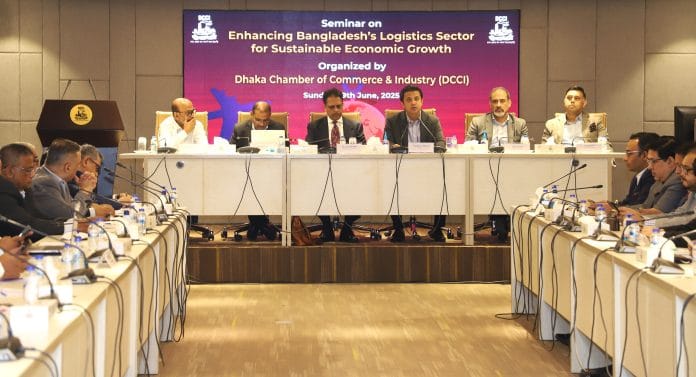Dhaka Chamber of Commerce & Industry (DCCI) President Taskeen Ahmed has underscored the urgent need for a robust, long-term master plan to develop a resilient, efficient, and shock-absorbent logistics ecosystem capable of meeting the demands of global trade.
Speaking at a seminar titled “Enhancing Bangladesh’s Logistic Sector for Sustainable Economic Growth” held at the DCCI auditorium, he said that reducing logistics costs and enhancing efficiency are critical to remaining competitive internationally.
He noted that Bangladesh currently ranks 88th among 139 countries in the 2023 Logistics Performance Index, with logistics costs estimated at 15–20 percent of GDP—much higher than the global average of 8–10 percent.
Taskeen Ahmed highlighted port congestion, customs delays, and fragmented infrastructure as persistent challenges.
He called for upgrades to Chattogram and Mongla ports—responsible for handling 92 percent of international trade—through container scanners, off-dock automation, AI-driven traffic management, and flexible port charges.
He also recommended digital platforms to connect shippers and transporters, deployment of warehouse management systems (WMS), robotics, and cold-chain logistics to ensure multimodal integration of road, rail, river, and sea transport.
He further urged full implementation of systems like ASYCUDA and the National Single Window to reduce bureaucratic bottlenecks and facilitate faster cross-border trade.
Keynote: Logistics Could Boost Exports by 20 percent
In his keynote presentation, Dr. M. Masrur Reaz, Chairman and CEO of Policy Exchange Bangladesh, noted that although Bangladesh has made significant economic strides, its overdependence on RMG exports (82 percent of total) and failure to diversify products and markets remain challenges.
He said Bangladesh lags behind regional peers in global competitiveness, innovation, and skills indices. Highlighting the economic potential of logistics, he noted that a 25 percent reduction in logistics costs could increase exports by 20 percent, and a 1 percent drop in transportation costs could result in a 7.4 percent export boost.
He called for immediate rollout of the National Logistics Policy supported by a sub-sectoral development roadmap. He also urged improvements in air, rail, sea, land ports, ICDs, and cold-chain logistics, as well as centralized bonded warehouses for SMEs.
Experts Call for Stakeholder Inclusion, Private Sector Engagement
Dr. Sheik Moinuddin, Special Assistant to the Chief Adviser at the Ministry of Road Transport and Bridges, emphasized the need for a multimodal transport ecosystem and revealed that the government is preparing a 25–50-year integrated transport strategy. However, he cautioned that policy effectiveness is often undermined by inadequate stakeholder involvement.
BIWTC Chairman Md. Salim Ullah said a committee has been formed to revisit the recently approved logistics policy. BIWTA is also working on a master plan to improve inland water transport logistics.
Abul Kasem Khan, Chairperson of BUILD, pointed out that Bangladesh’s logistics sector has seen limited progress and stressed the need for 8–10% of GDP—roughly $20 billion annually—in infrastructure investment. He proposed declaring 2026–2035 as the “Logistics Decade” and establishing a dedicated ministry or authority for the sector.
Public-Private Partnership & Investment Emphasis
CPA’s Additional Secretary Md. Habibur Rahman said port capacity is projected to reach 10 million TEUs by 2030, but private sector engagement is essential to fully utilize this potential. He proposed a dedicated truck expressway between Chattogram Port and Sitakunda and called for public-private cooperation to revitalize underperforming facilities like Pangaon River Port.
IDCOL CEO Alamgir Morshed emphasized the need for long-term financing, proposing bond instruments and foreign investor participation to bridge funding gaps.
Shamim Ul Huq, Country Director of DP World Bangladesh, advocated for gradual adoption of digital technologies to enhance warehouse productivity.
ADB’s Senior Project Officer Humayun Kabir reaffirmed ADB’s commitment to supporting logistics reforms through technical assistance and ongoing research.
Mohammad Naquib Uddin Khan, President of Bangladesh Supply Chain Management Society, urged greater investment and PPP initiatives to reduce costs and improve reliability in logistics operations.
Also speaking were Rear Admiral (Retd.) M Khaled Iqbal, former CPA Chairman; Abdul Haque, President of BARVIDA; Osama Taseer and M. Abu Horairah, former DCCI leaders; and others. Speakers emphasized the need for increased dredging, improved river navigability, and private sector-led ICD development. DCCI Senior Vice President Razeev H Chowdhury and Vice President Md. Salem Sulaiman were present at the event.

